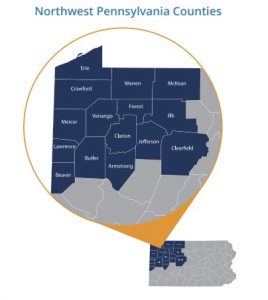 The Northwest Pennsylvania (NW PA) Veteran Suicide Prevention Program operates on a three-pronged approach involving healthcare providers, community organizations, and Veterans and their families in the 15 counties of NW PA. The Animal Friends for Veterans program is a resource we provide information about and encourage all to support. Because of this, we’re sharing a recent article published by NextPittsburgh about the program and those who have benefited from animal companions.
The Northwest Pennsylvania (NW PA) Veteran Suicide Prevention Program operates on a three-pronged approach involving healthcare providers, community organizations, and Veterans and their families in the 15 counties of NW PA. The Animal Friends for Veterans program is a resource we provide information about and encourage all to support. Because of this, we’re sharing a recent article published by NextPittsburgh about the program and those who have benefited from animal companions.
If you have any questions or would like to speak with someone about publicizing the NW PA Veteran Suicide Prevention Program in your community, please reach out to us.
Read time: 5 minutes
Strengthening Bonds Between Pets and Veterans

In 2020, about 5.2 million veterans experienced a behavioral health condition and an average of 16.8 veterans took their own lives each day. But a bond with a pet could be the lifeline they need.
Along with mental health treatment, a furry companion has been shown to support mental health. Dogs have been shown to alleviate fear, prevent isolation and even supplement talk therapy and medication.
That is why Animal Friends for Veterans brings dogs, cats and rabbits to veterans, matching vets to their perfect pet at no cost.
“It’s not just about adoption and training,” says Melissa Stammely-Park, therapeutic programs coordinator for Animal Friends, an Ohio Township-based animal shelter. “It’s about retention.”
The program even ensures that veterans with disabilities and other hardships can continue to take care of their pets regardless of financial or other strains. Veterans get 20% off veterinary services and medication at the clinic, as well as 20% off dog training, and access to free nutritious food for the animals through the Chow Wagon Pet Food Bank. The pets do not need to originate from Animal Friends to qualify for services.
“If they can’t come to us, we have a network of trainers we’ve vetted who may even be willing to go into the home,” Stammely-Park says. “We have also sent pet food directly to people outside of our area if they need it.”
Pets can even get emergency boarding from Animal Friends or its partner kennels for veterans in crisis.
“Veterans who need to be hospitalized, who are facing eviction — they reach out and if they don’t have friends or family who can care for their pet, we can board them here or with another kennel,” Stammely-Park adds.

The program began as part of the national Pets for Vets program, but that program was focused only on bringing specially trained dogs for veterans. Stammely-Park says that the veterans they serve benefit from even nontrained animals. Animal Friends separated from the Pets for Vets program in 2021 and added cats and rabbits as adoptable options.
The Major Ben Follansbee Fund supports the program. Follansbee was a highly decorated Green Beret from Pittsburgh who served multiple tours in Iraq and Afghanistan. He was wounded in 2005 while serving in Iraq as an airborne Army Ranger when an improvised explosive device struck his vehicle.
Follansbee earned two Bronze Stars, a Joint Service Achievement Medal, an Army Achievement Medal, an Army Service Medal and a NATO medal. He was also promoted to major.
In 2012, he took his own life.
“His parents felt that if he had a pet, he would have felt more supported and able to deal with his trauma from his experiences in combat,” Stammely-Park adds.
Bob Fragasso, CEO of Fragasso Financial Advisors, is a founder of the program, board treasurer and member of Animal Friends’ Veterans Ambassador Council, which works to connect veterans with Animal Friends’ services.
“It is gratifying to participate in the program, which reduces the post-traumatic stress for military veterans and potentially lessens the risk of veteran suicide,” he says. “It provides loving homes with those veterans for the dogs, cats and bunnies that come into our care. Everyone wins.”
Last year, Animal Friends helped 36 veterans adopt pets, and there have been 24 adoptions so far this year. Veterinary care, pet food bank, training and emergency boarding assisted over 1,000 veterans in the last two years.
The program works closely with the Veterans Leadership Program to help reach out to veterans. Animal Friends also has about eight volunteer ambassadors who communicate directly with veterans in the region.
Army veteran David Hudson, 60, suffers from severe post-traumatic stress disorder and anxiety from combat. Last month, he adopted a medium doberman-dachshund mix he named Rio. Rio was his second dog from the Animal Friends for Vets program.

For Hudson, and for Rio, it is a great match.
“Rio calms me down so much,” he says. “I talk to him and he seems to know what I’m saying. I registered him as an emotional support animal and he goes where I go. He’s absolutely perfect. When I went to the veterans’ hospital, he came with me. He doesn’t like elevators very much, though.
“I highly recommend the program for every vet. Animal Friends has been wonderful with followup,” Hudson adds.
“He loves chasing the ball and a Frisbee,” he says. “This dog is the most perfect fit dog I’ve ever had in my life, and I’ve had dogs since I was little. The only time I didn’t have a dog was when I was in the Army.”
“For the veterans that we have provided emergency care for, I’ve had at least two tell me that the reason they didn’t take their own life was because they didn’t want something to happen to their pet,” Stammely-Park says. “Those animals are sometimes their primary tether to the world. That is powerful. We want to make sure things like money don’t get in the way of that bond.”
Looking to Get Involved?
 Whether you identify as a healthcare provider, community organization, or Veteran, there are several opportunities through the NW PA Veteran Suicide Prevention Program and PERU to connect to resources, participate in educational training, and promote harm reduction strategies. We are actively recruiting healthcare and community partners to work with us in meeting our goals and objectives. To learn more, visit the program website at theresilientveteran.org.
Whether you identify as a healthcare provider, community organization, or Veteran, there are several opportunities through the NW PA Veteran Suicide Prevention Program and PERU to connect to resources, participate in educational training, and promote harm reduction strategies. We are actively recruiting healthcare and community partners to work with us in meeting our goals and objectives. To learn more, visit the program website at theresilientveteran.org.
Need Help? Know Someone Who Does? Contact the National Suicide Prevention Lifeline at 988 or use the online Lifeline Crisis Chat. Both are free and confidential. You’ll be connected to a skilled, trained counselor in your area.

